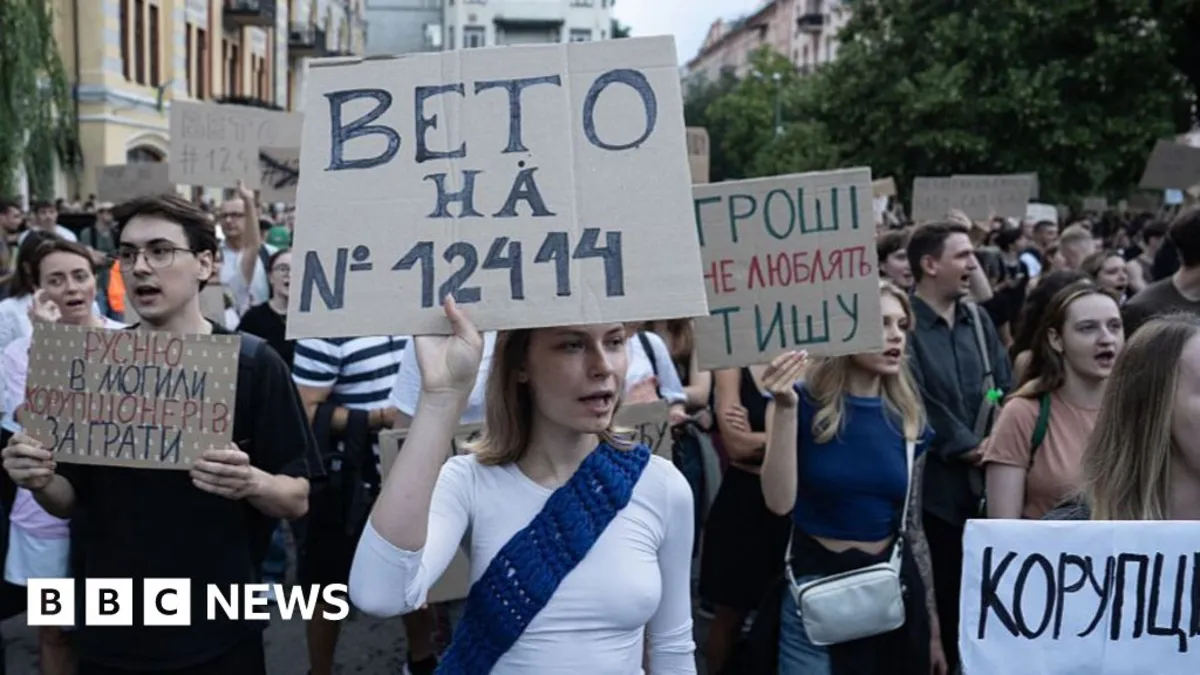
The Ukrainian government is facing significant backlash following President Volodymyr Zelensky's recent decision to sign a law that restricts the independence of two key anti-corruption agencies. This controversial legislation grants control of the National Anti-Corruption Bureau (Nabu) and the Specialised Anti-Corruption Prosecutor's Office (Sap) to the prosecutor general, a position appointed by the president himself. Critics argue that this move could severely undermine the authority and effectiveness of these vital institutions.
In defending the law, Zelensky claimed that both Nabu and Sap had allowed criminal proceedings to stagnate for years, asserting a need to cleanse them of Russian influence. The bill was signed into law late Tuesday, receiving overwhelming support from 263 out of 324 MPs in the Ukrainian parliament, the Rada. However, many Ukrainians outside of the legislative body vehemently oppose the decision, fearing it will set back hard-won progress in the fight against corruption.
On the night of the law's passage, thousands gathered outside the president's office in Kyiv to protest the decision. Smaller demonstrations also took place in cities like Odesa, Dnipro, Lviv, and Sumy, despite ongoing threats from Russian aerial attacks. These protests marked the first significant anti-government demonstrations since Russia's full-scale invasion of Ukraine in 2022, reflecting the deep discontent among citizens regarding government accountability and corruption.
The fight against corruption is intricately linked to Ukraine's aspirations for closer integration with the European Union (EU). This journey began in 2014, when anti-government protests ousted the pro-Russian President Viktor Yanukovych in favor of a pro-Western agenda. Establishing Nabu and Sap was a crucial requirement set forth by the European Commission and the International Monetary Fund to facilitate Ukraine’s progress towards a relaxation of visa restrictions with the EU.
Despite Ukraine's current ranking of 105 out of 180 on Transparency International's Corruption Perceptions Index, which indicates a 39-point improvement since Nabu and Sap's establishment in 2014, concerns remain. The two agencies have conducted extensive investigations into corruption, resulting in significant arrests, including that of the head of Ukraine’s Supreme Court, Vsevolod Kniaziev, over a $3 million bribery case. Recent searches were also conducted at the residence of former defense minister Oleksii Reznikov, further highlighting ongoing issues of graft.
The new oversight by the presidential office raises concerns that high-profile government figures may escape scrutiny. A protester in Kyiv voiced a sentiment shared by many, stating that the government had effectively dismantled years of progress in the fight against corruption. Despite a nationwide ban on mass gatherings under martial law, further protests were expected in various cities across Ukraine, emphasizing the public's discontent.
The passage of this law has sparked alarm among Ukraine's European allies. German Foreign Minister Johann Wadephul warned that the legislation could hinder Ukraine's aspirations for EU membership, while France’s European Affairs Minister Benjamin Haddad urged Kyiv to reconsider its decision. In response to the backlash, Zelensky met with representatives of Nabu and Sap, acknowledging the protests and promising a joint plan to combat corruption within two weeks. However, he also emphasized the need for unity against Russian aggression.
In a joint statement, Nabu and Sap expressed concern that the new law deprives them of the guarantees necessary to effectively combat corruption. The situation remains tense, as many Ukrainians are focused on the implications of this legislation rather than the ongoing negotiations between Russia and Ukraine in Istanbul. As one Lviv resident articulated, “We don’t want to have to fight both Russia and our own government,” highlighting the dual challenges faced by the nation in its ongoing struggle for sovereignty and integrity.